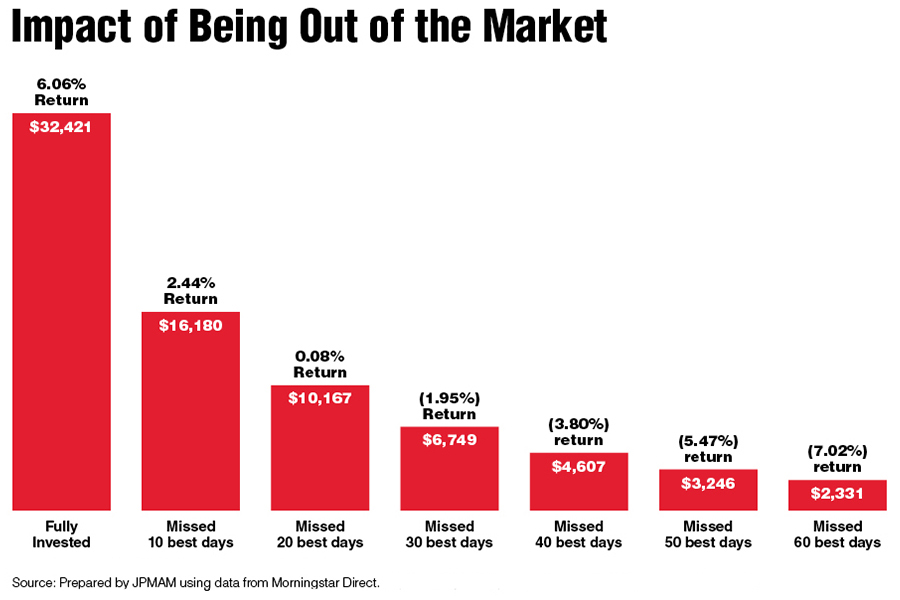

Advisers play a critical role helping retirement investors and plan participants stay on track during periods of extreme market volatility like we’re witnessing at the current time. Making tactical moves such as rebalancing portfolios, replacing underperforming managers and managing taxes by matching gains and losses are all effective strategies to consider in the current environment.
However, despite the best efforts of advisers, emotions can run high at times like this, and end investors may be tempted to retreat or sell out of the market after a significant drawdown — locking in their losses and looking to reenter when the market feels "safer." Ultimately, knee-jerk reactions during periods of volatility can have a devastating impact on retirement outcomes.
Investors risk missing out through ‘loss aversion-induced’ selling
In my recent conversations with advisers, one point I highlight is just how closely the best days in the market often follow the worst, and how important being invested for those good days can be to the recovery of a client’s portfolio. While it’s easy to get caught up in the day-to-day market headlines, it’s important to focus on what history can teach us about the benefits of staying invested.
To help advisers demonstrate this point to anxious investors tempted to panic sell, we included a chart in the J.P. Morgan 2020 Guide to Retirement outlining the impact of missing out on the best days in the markets, comparing the returns of a $10,000 investment in the S&P 500 over the past 20 years. The chart clearly highlights the benefits of avoiding the temptation to pull out of the market and risk missing the days with greatest gains.

‘Best’ days often very close to the ‘worst’
Often a client’s first instinct will be to assume that the biggest upswings in markets occur at very different times than the most pronounced down days. If we look at market swings in recent times, however, 2019 saw six of the best days occur within two weeks of the worst days.
This trend has been even more pronounced in the COVID-19-impacted markets of 2020, where through April 13, that number has risen to as high as eight, with five of those best days occurring within just one week of a worst day.
Overwhelmingly, the worst days occur before the best days. On many occasions, our analysis shows that the worst days are followed the next day by one of the best days, meaning it’s literally impossible for an investor to reinvest in the market if they’ve pulled out after experiencing a poor return.
Advisers play a key role in supporting clients across the retirement finish line, and this is only magnified during times of significant volatility. It’s completely understandable that clients may look to take control and sell equities after a market drawdown to avoid additional losses. Yet historical data demonstrate that clients run a significant risk in missing out on market gains by letting emotion take over. Encouraging clients to stay invested through the worst and best days is the most likely to result in a successful retirement outcome.
Katherine Roy is chief retirement strategist at J.P. Morgan Asset Management.

A Texas-based bank selects Raymond James for a $605 million program, while an OSJ with Osaic lures a storied institution in Ohio from LPL.

The Treasury Secretary's suggestion that Trump Savings Accounts could be used as a "backdoor" drew sharp criticisms from AARP and Democratic lawmakers.

Changes in legislation or additional laws historically have created opportunities for the alternative investment marketplace to expand.

Wealth managers highlight strategies for clients trying to retire before 65 without running out of money.

Shares of the online brokerage jumped as it reported a surge in trading, counting crypto transactions, though analysts remained largely unmoved.
Orion's Tom Wilson on delivering coordinated, high-touch service in a world where returns alone no longer set you apart.
Barely a decade old, registered index-linked annuities have quickly surged in popularity, thanks to their unique blend of protection and growth potential—an appealing option for investors looking to chart a steadier course through today's choppy market waters, says Myles Lambert, Brighthouse Financial.
